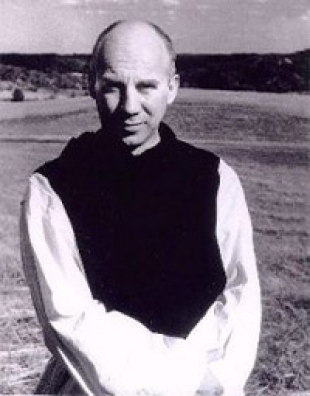Thomas Merton (1915 - 1968) was a Trappist monk, a social activist, a pioneer in interreligious dialogue, and a bestselling author. In addition to his critically acclaimed autobiography, The Seven Storey Mountain (1948), he wrote more than 100 books and pamphlets. One of his greatest gifts to the Christian community was his understanding of contemplative spirituality; he included within its embrace not only prayer but also mystical relationship to God, others, and the whole created universe.
Merton's interest in culture and social justice inspired him to write on a diversity of topics including racial conflict and the Third World. He was a forerunner of what Brother Wayne Teasdale called "interspirituality." Merton wrote on Taoism, Zen Buddhism, Sufism, Judaism, and Hinduism and corresponded with scholars and practitioners of these religions. In 1968 he made a pilgrimage to Asia visiting Sri Lanka, Singapore, and Thailand, meeting with the Dalai Lama and attending a Buddhist-Christian conference on monasticism.
Merton was a peace activist who wrote much about the evils of war and the nonviolence of Jesus and Gandhi. His views were very controversial and his order forbade him to continue writing about war. Though he then ceased to write on the subject for the general public, Merton continued to circulate his views among friends. The Thomas Merton Encycopedia by William H. Shannon, Christine M. Bochen, and Patrick F. O'Connell contains brief biographies of Merton's soul friends, including Daniel Berrigan, Ernesto Cardenal, Abraham Joshua Heschel, Rosemary Radford Ruether, Boris Pasternak, Thich Nhat Hanh, and many others. Over the years since his death, works have come out revealing Merton's creative output with poetry, drawings, calligraphies, and photographs.
Merton's accidental death in Bangkok on December 10, 1968, occurred on the twenty-seventh anniversary of his arrival at the Abbey of Gethsemani. He was 53 years old.
To Name This Day:
 Quotes
Quotes
To celebrate Thomas Merton's birthday, contemplate one or more of the brief quotes from his writings printed below.
- "Here is an unspeakable secret: paradise is all around us and we do not understand."
— from Conjectures of a Guilty Bystander
- "Not solitude for its own sake, as a withdrawal, a refuge: but for the sake of understanding, wisdom, widening a certain commitment."
— from Turning Toward the World
- "The need for ripeness — for the slow finishing work of God in me. It needs my desire, my consecrated attention, my submission, my withdrawal from noise and confusion."
— from Turning Toward the World
- "The only unhappiness is not to love God."
— from Dialogues with Silence
- "The evil in the world is all of our own making, and it proceeds entirely from our ruthless, senseless, wasteful, destructive, and suicidal neglect of our own being."
— from Seeds
- "The imagination should be allowed a certain amount of time to browse around."
— from Contemplation in a World of Action
- "The contemplative life is primarily a life of unity. A contemplative is one who has transcended divisions to reach a unity beyond division."
— from The Inner Experience
- "Fidelity to grace in my life is fidelity to simplicity, rejecting ambition and analysis and elaborate thought, or even elaborate concern."
— from A Year With Thomas Merton
- "Christ our Lord did not come to bring peace as a kind of spiritual tranquilizer. He brought to his disciples a vocation and a task: to struggle in the world of violence to establish His peace not only in their own hearts but in society itself."
— from Passion for Peace
- "Christians must become active in every possible way, mobilizing all their resources for the fight against war."
— from Seeds
 E-Courses
E-Courses
Sign up to receive our 40-part e-course "Practicing Spirituality with Thomas Merton" featuring excerpts from his books and suggestions on how to practice his wisdom in your daily life.
